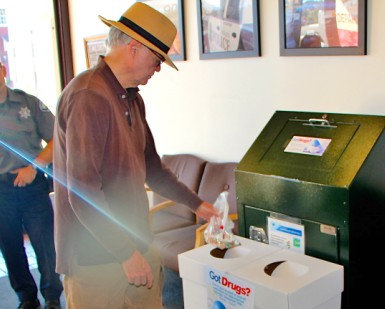San Rafael, CA – The opioid abuse crisis is a national phenomenon these days – there’s even a White House webpage devoted to it – but it’s been lingering in Marin County for decades. One in four Marin adults needs help for substance abuse, alcohol abuse or mental health problems, and medications are liberally prescribed to treat those issues.
 Dispose of unused and unwanted medications October 27 so Marin can exceed the 8,000 pounds collected at similar local events in 2017.
Dispose of unused and unwanted medications October 27 so Marin can exceed the 8,000 pounds collected at similar local events in 2017.To address the widespread availability of prescription drugs, agencies across Marin will participate in the U.S. Drug Enforcement Administration (DEA) Annual Take-Back Day on October 27. The Marin County Department of Health and Human Services (HHS) and other agencies are encouraging residents to rid their homes of potentially dangerous expired, unused, and unwanted prescription drugs and dispose of them at locations throughout Marin including the Novato, San Rafael, Fairfax police departments, and Central Marin Police Authority offices in Larkspur and San Anselmo.
In April 2018, Americans did their part to drop off a record number of unused, unwanted or expired prescription medications during the DEA’s 15th National Prescription Drug Take-Back Day at close to 6,000 sites across the country. The DEA collected and destroyed close to 1 million pounds – nearly 475 tons – of potentially dangerous prescription drugs, making it the most successful event in DEA history. In Marin County, more than 8,000 pounds were collected during take-back days last year.
The DEA Drug Take-back Day addresses a crucial public safety and public health issue. According to the 2016 National Survey on Drug Use and Health, 6.2 million Americans misused controlled prescription drugs. The study showed that most abused prescription drugs were obtained from family and friends.
In addition, Americans are advised that their most common methods for disposing of unused medicines — flushing them down the toilet or throwing them in the trash — both pose potential safety and health hazards. Medicines that languish in home cabinets are highly susceptible to diversion, misuse, and abuse. Rates of prescription drug abuse in the U.S. are alarmingly high, as are the number of accidental poisonings and overdoses due to these drugs. The DEA’s Take Back Day events provide an opportunity for Americans to prevent drug addiction and overdose deaths.
Marin County is committed to solving the opioid and prescription drug epidemic with the assistance of local partners and grassroots community coalitions like RxSafe Marin. Opioid overdose remains the leading cause of accidental death in Marin County. RxSafe Marin, which includes the participation of Marin HHS and several other County departments, is working to limit the burden of prescription opioids by promoting safe prescribing by clinicians and increasing opportunities for safe disposal of unused and unwanted medications.
Susan Kim, Marin native and member of RxSafe Marin, lost her son Trey to a prescription drug overdose in January 2013.
“When Trey passed away, he died from using a concoction made with codeine cough syrup – ‘seizure’ and ‘purple drank’ are some of the slang names,” Kim said. “I didn’t really know anything about prescription drug abuse or that young people used prescription drugs recreationally. So, not only was I faced with the horror of losing my son, I had a lot of questions, like, cough syrup? How do people die from cough syrup?”
For people like Kim, RxSafe Marin provides a forum to educate various audiences about her loss. According to a recent study, one in 10 Marin high school juniors reported having taken prescription painkillers recreationally.
“Educating our community about storing and disposing of prescription drugs properly is a big focus of my work and my effort,” Kim said. “Keeping narcotic medications secure and out of the supply stream is one simple way we can all become a soldier in the fight against the prescription drug epidemic and hopefully spare another family the horror that I’ve experienced.”
On October 27, dropoff locations will accept prescriptions drugs, over-the-counter medications and vitamins from 10 a.m. to 2 p.m. The service is free and anonymous – no questions asked. Note that dropoff locations cannot accept liquid meds or needles.